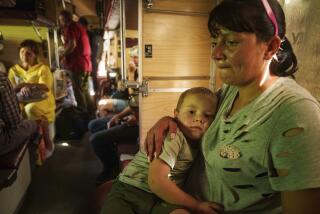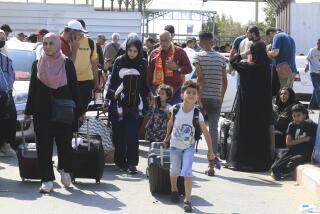Serbs Step Up Advance Into Croatia; Refugees Flee From 3 Towns on Danube : Yugoslavia: Tudjman stops short of calling for a declaration of war but cites ‘life or death’ battle for republic’s survival.
- Share via
ZAGREB, Croatia — The Serbian advance into Croatia accelerated Thursday, with aircraft and tank attacks reportedly driving streams of refugees from three Croatian towns along the Danube River southeast of Zagreb.
In the face of the advance by Serbian militia units, apparently with federal army assistance, the Croatian republic leadership in Zagreb appeared unable to mount more than a token response.
A newly appointed defense minister called a partial civilian mobilization, affecting mostly those who have been displaced from Croatian towns and villages by the Serbian advance. He said Croatian police and national guardsmen would be empowered to requisition civilian vehicles if necessary.
Croatian President Franjo Tudjman, in a 90-minute address opening an emergency Parliament session that went late into the night, stopped short of calling for a declaration of war but said, “We are being forced to lead a battle for life or death, for the survival of the Croatian people and Croatia.”
The Zagreb City Council passed a resolution urging the republic’s Parliament to declare a state of war against Serbia, but there were strong fears that such a declaration could unleash the full might of the federal Yugoslav army in the battle, perhaps leading to an air attack on Zagreb.
The army, officially the defense force of the fracturing Yugoslav Federation, is led by a Serbian-dominated officer corps, and the Croats have charged that the army has repeatedly violated its official role as a buffer and peacekeeper between Croatian forces and nationalist fighters from ethnic Serb areas of Croatia and, in battles between the two, has invariably acted against the Croatian forces.
In recent days, the poorly equipped Croatian units have repeatedly fallen back, outgunned and outnumbered by the Serbian paramilitary units. In cases where they have put up a fight, the Serb fighters have moved to the side, leaving the Croats firing at the federal army. The army, as it has repeatedly warned it would do, has attacked, using tanks, armored personnel carriers and, in some cases, jet aircraft, quickly routing the Croatian guardsmen and police units.
Croatian witnesses told Zagreb television Thursday that planes repeatedly attacked the towns of Dahl, Erdut and Almas, along the Danube in the eastern Croatian region of Slavonia.
Zagreb television showed streams of refugees fleeing the towns, some of them boarding river barges for the journey to Osijek, the largest town in the region. The hospital in Osijek reported receiving the bodies of three national guardsmen and one civilian--an 80-year-old woman--and 23 wounded.
Late Wednesday night and early Thursday, a 3-mile-long convoy of buses took refugees out of the town of Kostajnica, a target of the Serb militias for several days. The town had been repeatedly strafed by jet warplanes.
Early Thursday evening, the town of Sunja was reported by Zagreb television as being under “grenade” attack, although weapons being used were probably mortars, which have been used extensively by the Serbian guerrilla units.
Tudjman, in his address to an angry and frustrated Parliament, admitted for the first time what most Croats had known for days--that he had been reluctant to call a general mobilization because the republic does not have enough arms or materiel to equip an army equal to the one it is facing. Many observers believe that it is unequipped to deal with only the Serbian guerrilla units, let alone the national army with its armor, air force and vastly superior firepower.
As currently constituted, Croatian forces number about 70,000, and a full mobilization of reserves, if it were made, might add about 30,000 more. But the present units are poorly trained, badly clothed and equipped only with small arms and a few antitank weapons, which have not so far been used, they say, for fear of provoking a full assault by the federal army.
The Serb paramilitary units are believed to total about 20,000. In addition, about a quarter of the army’s 180,000 regular soldiers are in Croatia, with some units reportedly providing logistics and aerial reconnaissance to Serb militiamen, if not fighting side by side with them.
The frustration of the Parliament seemed equaled Thursday by the gloom in the streets of Zagreb. From both places came bitter criticism of the Tudjman government, elected last year on a tide of nationalistic slogans, which seemed to set the republic on its course of declaring independence from the Yugoslav federation in June.
Neighboring Slovenia made the same move, but was far better prepared for the event, having carefully mobilized a diplomatic defense. Intercession by the European Community brought a cease-fire for Slovenia, and the republic appears to be on its way to full independence.
But the explosive ethnic mix in Croatia, which includes about 600,000 Serbs, brought a far different result here, one that has discouraged any settlement by Europe, despite its concern.
In the midst of nationalist excitement of their own, the militant Serbs of Croatia moved to resist the Croatian independence bid and to seize a strip of land they call Krajina, which runs through the heart of Croatia and is heavily populated with ethnic Serbs.
The bitter fight is further fueled by an ancient enmity of religious and political differences and, more lately, by the scars of World War II, when the Croats, in a Nazi puppet state, exterminated thousands of Serbs in concentration camps.
The crisis of the Serbian advance, which has daily carved off more territory for the “new” Serbia, has put Tudjman and his Croatian Democratic Party under paralyzing pressure.
A Croatian parliamentary group suggested a plan to give full autonomy to Serbs living in Croatia, including their own police and court systems, with a special “national council” allowing them a unique voice in the government. But the proposal has not been put forward in Parliament and would probably not be accepted by the militant Serbs, even in the unlikely event that it were adopted.
At the same time, hard-line Croats, including the freshly dismissed defense minister, are demanding all-out war. The hawks argue that at least a war could bring the intervention of Europe, which might lead to a negotiated settlement.
More to Read
Sign up for Essential California
The most important California stories and recommendations in your inbox every morning.
You may occasionally receive promotional content from the Los Angeles Times.













